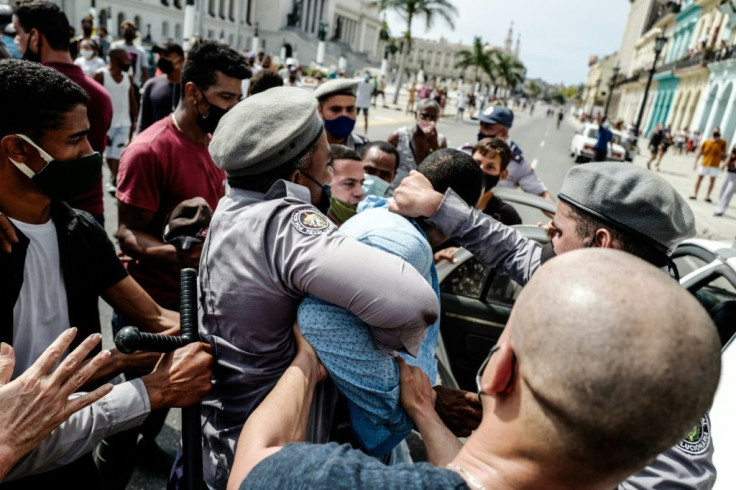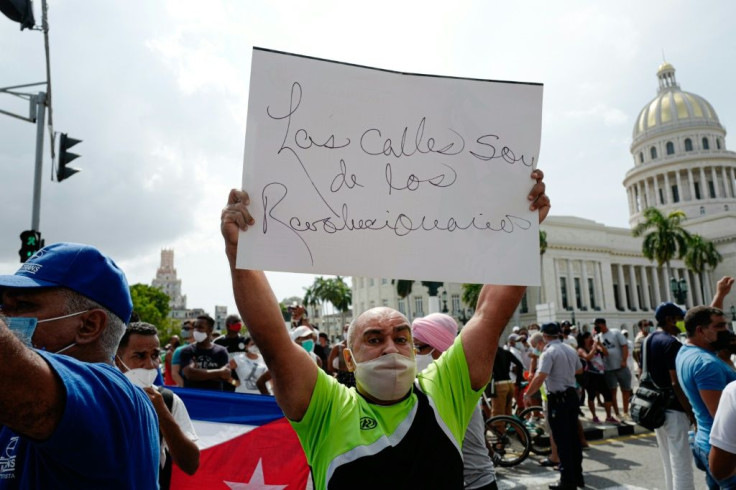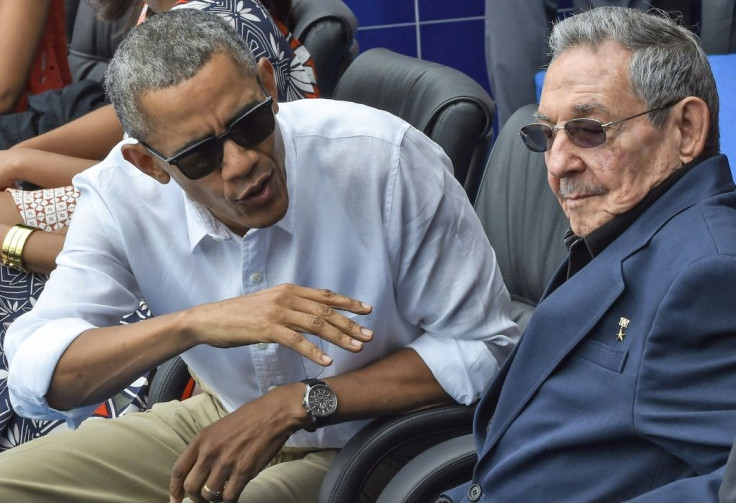Biden Voices Solidarity As Cuba Protests Jolt Go-slow Approach
Historic mass protests in Cuba have thrust onto US President Joe Biden's priority list an issue on which he was content to go slow and, experts say, will likely doom near-term prospects of a fresh opening.
Biden issued a statement to voice solidarity with "the Cuban people and their clarion call for freedom," and the White House warned authorities not to use force after thousands poured onto the streets Sunday amid the worst economic crisis in decades.
Cuba has seen a whiplash in US policy with former president Barack Obama normalizing relations at the end of his term, declaring that a half-century of efforts to topple the regime had failed, and then his successor Donald Trump reimposing sweeping economic pressure.
Biden, who served as Obama's vice president, ordered a review upon taking office but his White House openly said it was in no rush, with Press Secretary Jen Psaki in March saying Cuba policy is "not currently among President Biden's top priorities."

Clouding over Cuba policy is domestic politics in the United States, with fervently anti-communist Cuban-Americans holding sway in the key electoral state of Florida, where Democrats were stunned last year by Trump's strong gains among Hispanic voters.
Ryan Berg, a senior fellow at the Center for Strategic and International Studies who studies Latin America, said that the Biden administration saw more urgency in addressing migration from Central America -- another heated issue at home.
"That pretty naturally took precedence over a country that has been frozen in time for 60-plus years. It's pretty tough to move the needle on Cuba and we've tried all sorts of things," Berg said.

Biden as a candidate had floated restoring Obama moves by lifting restrictions on remittances and travel to the island 145 kilometers (90 miles) from Florida.
But he has not followed through and stayed silent on a last-minute decision by Trump's State Department to declare Cuba a state sponsor of terrorism, which carries stiff sanctions.
Berg expected Biden to expedite the policy review but said he would be hard-pressed to renew an opening if Cuba cracks down on protests.

"This might force the Biden administration to back off but at the very least it forces them to pay attention," he said.
Biden has similarly shown little interest in shaking up policy on Venezuela, where Trump unsuccessfully tried to depose leftist leader Nicolas Maduro.
Biden was forced to confront another regional issue on the backburner last week as Haiti's president was assassinated, although his administration declined a troop request from the troubled Caribbean nation.
Democrats control Congress only by the narrowest of margins and Senate Foreign Relations Committee Chairman Bob Menendez -- crucial for pushing through nominations -- is a Cuban-American who breaks with much of the party by favoring a hard line against the government founded by Fidel Castro.
Another legacy likely on Biden's mind -- Iran. At nearly the same point in his presidency, Obama stayed cautious in remarks on a violent crackdown on protests, mindful that the clerical regime -- like Cuban President Miguel Diaz-Canel on Monday -- was eager to link protesters to the United States.
Obama in his post-presidential memoir wrote that he was deeply uncomfortable with the "passive approach" recommended by aides -- which drew ferocious condemnation from the rival Republican Party.
Republicans have already pounced on the Biden administration's Cuba response, including an initial tweet by the career diplomat in charge of Latin America who tied the protests to rising Covid-19 cases.
Senator Marco Rubio, a Florida Republican and vociferous critic of Havana, called the comment "ridiculous" and warned that Cuban authorities would try to "blackmail" Biden by threatening an exodus of boat people if he does not restore Obama-era policies.
John Kavulich, president of the US-Cuba Trade and Economic Council, which advises US businesses about the island, said the protests would build pressure to complete the Cuba review -- but he doubted Biden would ever restore Obama measures such as allowing cruise ships.
"Each micron of United States policy impacting the Republic of Cuba is viewed by the Biden administration through one political microscope -- getting legislation and nominations and budgets and debt ceiling and infrastructure and other measures through in 2021 and then preparing for the 2022 elections and the 2024 elections," he said.
© Copyright AFP 2024. All rights reserved.





















